前言
本文主要实现了以下功能:
1、 单文件上传以及多文件上传功能
2、 输入文件名下载文件功能
3、 输入音频文件名在线播放音频功能
一、项目基础部分搭建
1.1 前端项目搭建
1.1.1 新建前端项目
打开命令行输入以下命令,使用Vue CLI创建前端项目,Vue CLI安装教程
vue create file-demo
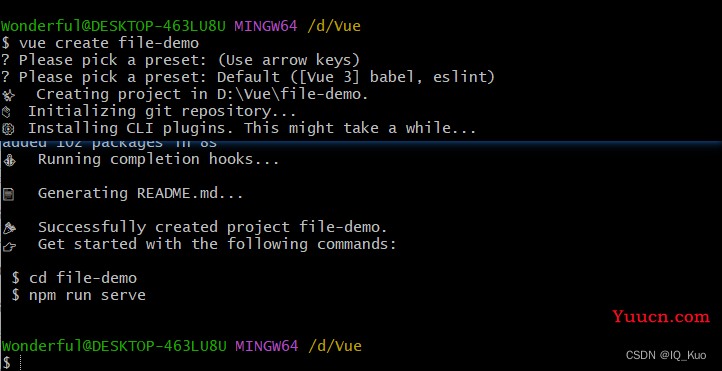
1.1.2 引入axios
输入以下命令在项目中引入axios
npm install axios --save
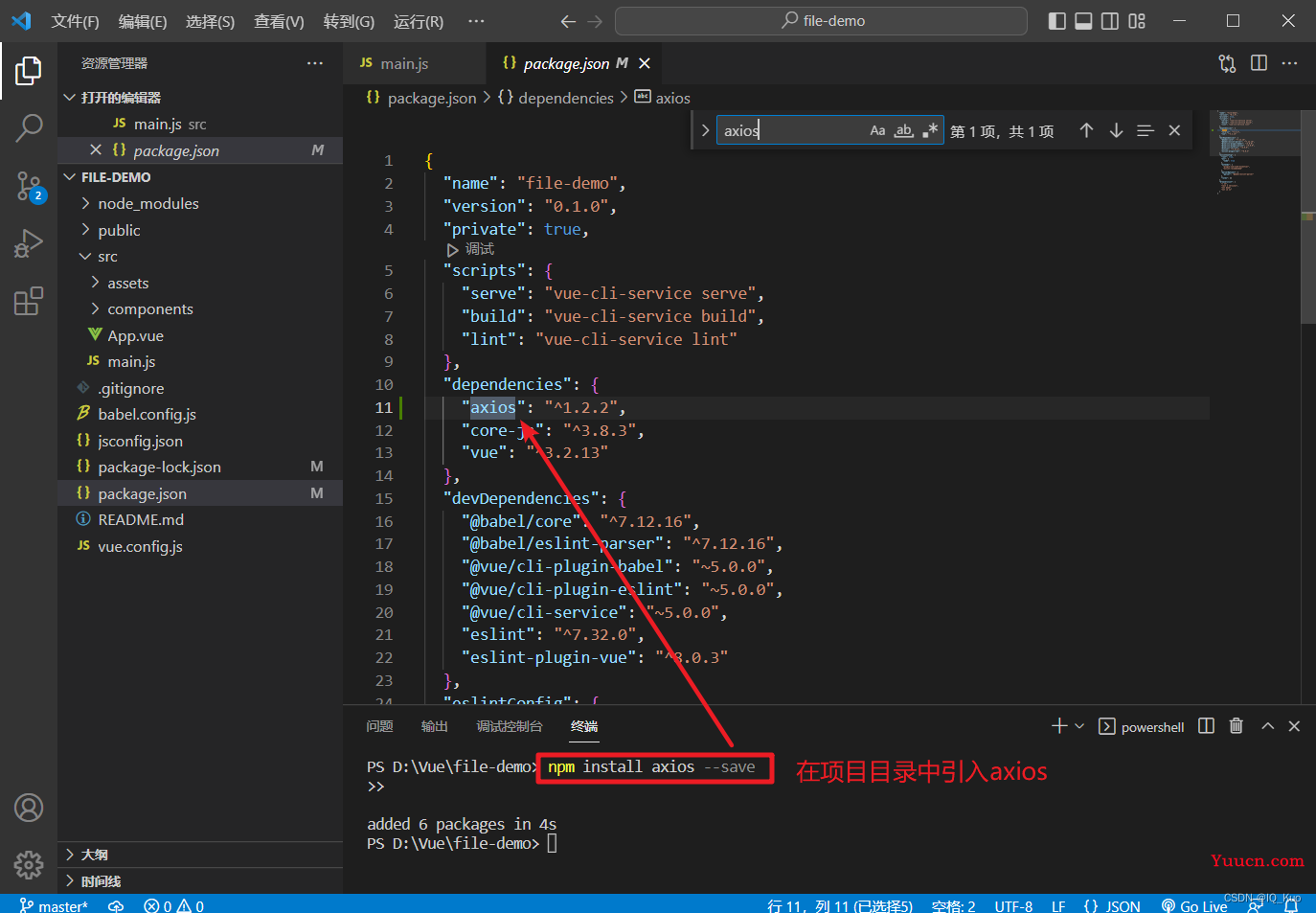
1.1.3 解决跨域问题
打开vue.config.js添加以下配置,修改启动端口,以及配置代理解决跨域问题
const { defineConfig } = require('@vue/cli-service')
module.exports = defineConfig({
transpileDependencies: true
})
module.exports = {
devServer: {
// 修改前端项目启动端口号
port: 8081,
proxy: {
'^/file': {
// 此处配置对应的后端端口
target: "http://localhost:8080",
// 如果是https接口,需要配置这个参数为true
secure: false,
// 此处配置路径重写
pathRewrite: {
'^/file': '/file'
}
}
}
}
}
1.2 后端项目搭建
1.2.1 新建后端项目
打开IDEA,按照以下步骤创建一个新的SpringBoot项目
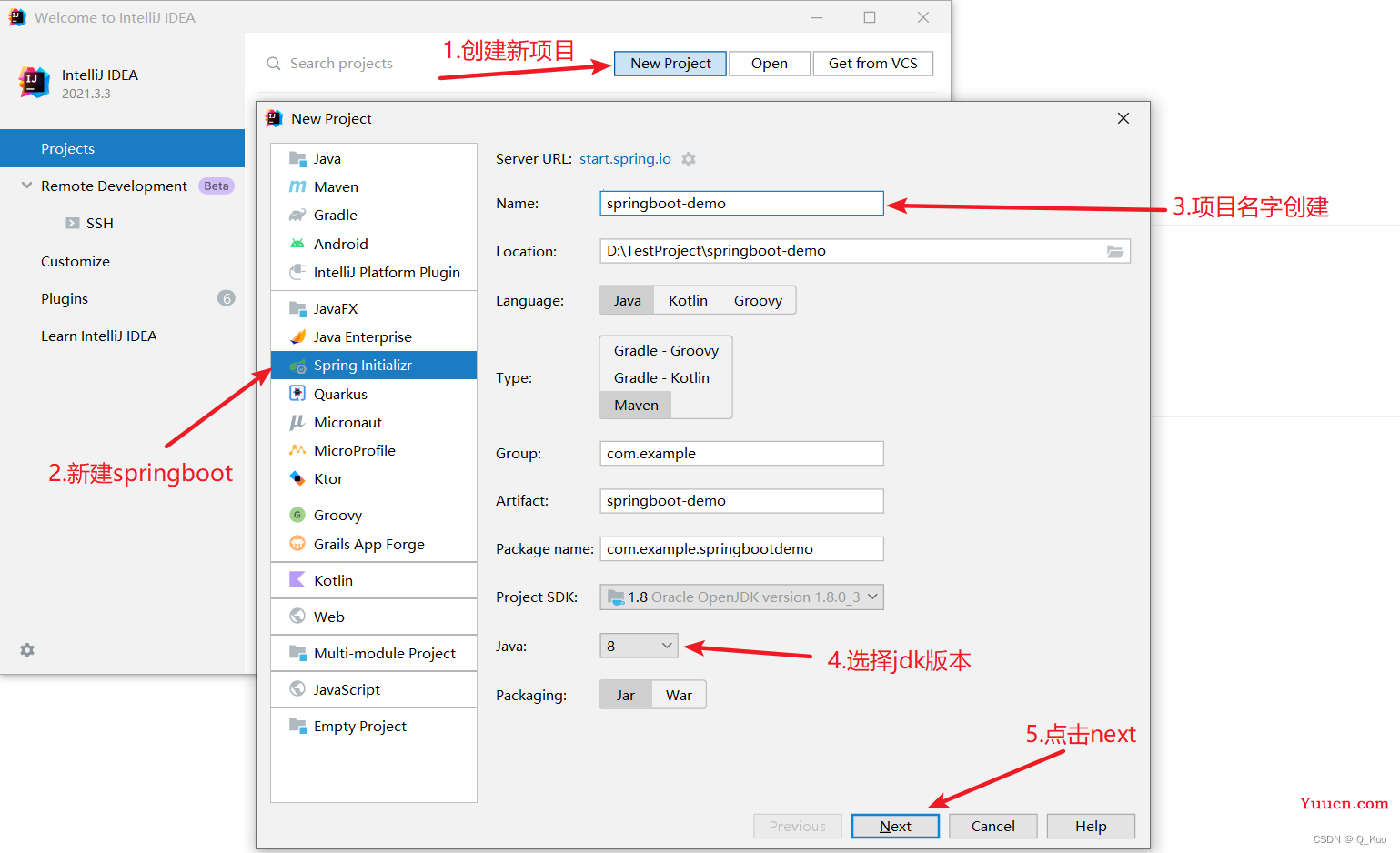
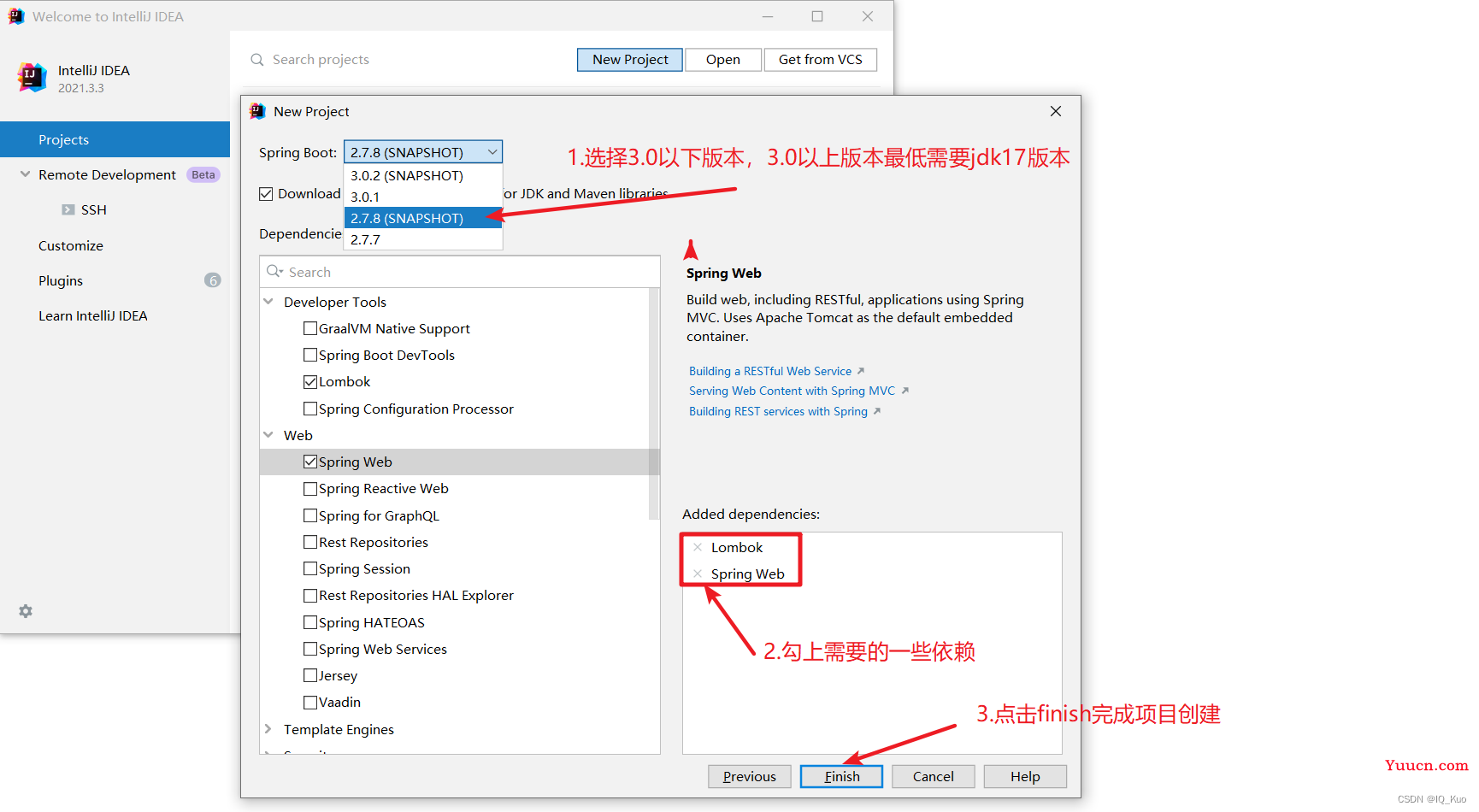
1.2.2 编辑配置文件
打开项目,编辑application.properties配置文件,输入以下配置
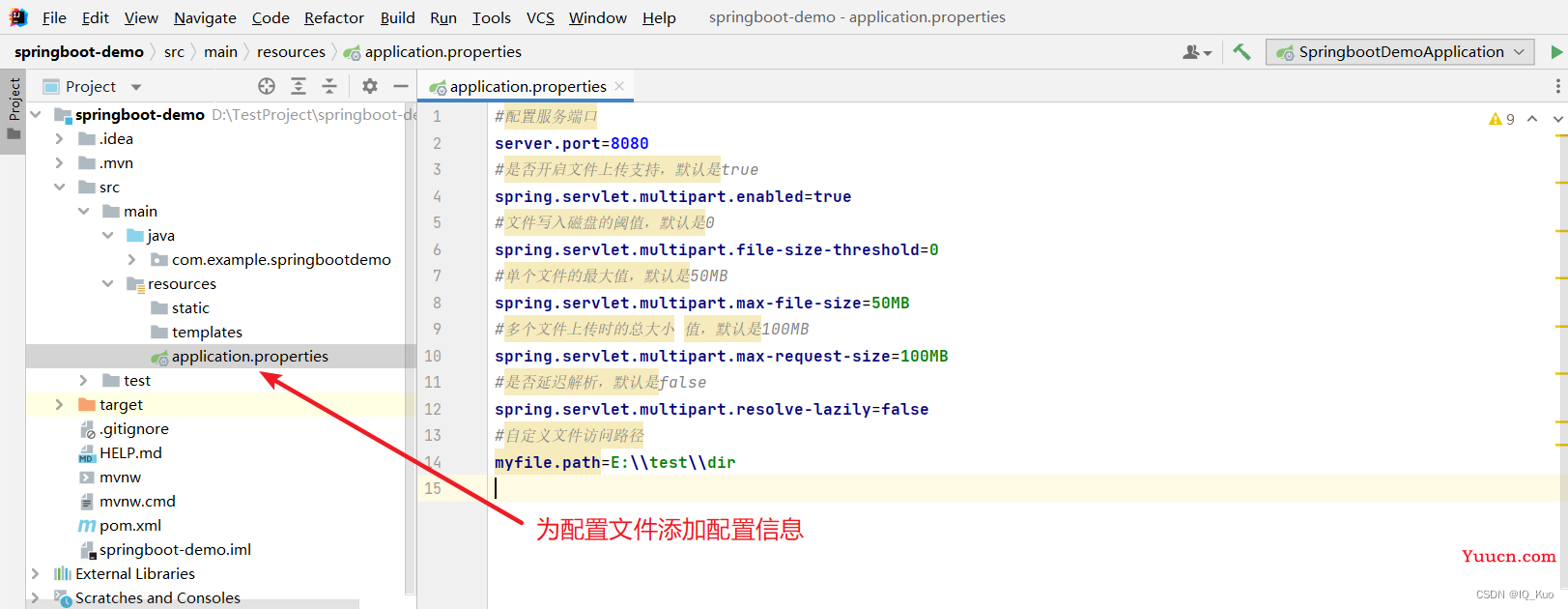
#可以选择性的修改或选择以下配置
#配置服务端口
server.port=8080
#是否开启文件上传支持,默认是true
spring.servlet.multipart.enabled=true
#文件写入磁盘的阈值,默认是0
spring.servlet.multipart.file-size-threshold=0
#单个文件的最大值,默认是50MB
spring.servlet.multipart.max-file-size=50MB
#多个文件上传时的总大小 值,默认是100MB
spring.servlet.multipart.max-request-size=100MB
#是否延迟解析,默认是false
spring.servlet.multipart.resolve-lazily=false
#自定义文件访问路径
myfile.path=E:\\test\\dir
二、文件上传功能
2.1 单文件上传功能实现
2.1.1 前端代码
在App.vue中添加如下代码,使用form标签实现文件上传功能
<template>
<p>单文件上传</p>
<form action="/file/uploadSingleFile" method="post" enctype="multipart/form-data">
文件:
<input type="file" name="file">
<input type="submit">
</form>
</template>
2.1.2 后端代码
在com.example.springbootdemo.controller包下创建UploadFileController.java文件
package com.example.springbootdemo.controller;
import lombok.extern.slf4j.Slf4j;
import org.springframework.beans.factory.annotation.Value;
import org.springframework.web.bind.annotation.PostMapping;
import org.springframework.web.bind.annotation.RequestMapping;
import org.springframework.web.bind.annotation.RequestParam;
import org.springframework.web.bind.annotation.RestController;
import org.springframework.web.multipart.MultipartFile;
import java.io.File;
import java.io.IOException;
@Slf4j
@RestController
@RequestMapping("/file")
public class UploadFileController {
@Value("${myfile.path}")
private String filePath;
// 单文件上传功能
@PostMapping("/uploadSingleFile")
public void uploadSingleFile(@RequestParam("file") MultipartFile multipartFile) {
String fileName = multipartFile.getOriginalFilename();
File file = new File(filePath + '\\' + fileName);
if (!file.getParentFile().exists()) {
file.getParentFile().mkdirs();
log.info("父级文件目录不存在,已创建目录");
}
try {
multipartFile.transferTo(file);
} catch (IOException e) {
log.error("{}",e);
log.error("程序错误,请重新上传");
e.printStackTrace();
} finally {
log.info("文件上传成功,文件全路径名称为:{}",file.getPath());
}
}
}
2.2 多文件上传功能实现
2.2.1 前端代码
在App.vue中添加如下代码,使用form标签实现文件上传功能
<template>
<p>多文件上传</p>
<form action="/file/uploadMultipleFile" method="post" enctype="multipart/form-data">
文件:
<input type="file" name="files" multiple="multiple">
<input type="submit">
</form>
</template>
2.2.2 后端代码
在com.example.springbootdemo.controller包下创建UploadFileController.java文件
package com.example.springbootdemo.controller;
import lombok.extern.slf4j.Slf4j;
import org.springframework.beans.factory.annotation.Value;
import org.springframework.web.bind.annotation.PostMapping;
import org.springframework.web.bind.annotation.RequestMapping;
import org.springframework.web.bind.annotation.RequestParam;
import org.springframework.web.bind.annotation.RestController;
import org.springframework.web.multipart.MultipartFile;
import java.io.File;
import java.io.IOException;
@Slf4j
@RestController
@RequestMapping("/file")
public class UploadFileController {
@Value("${myfile.path}")
private String filePath;
// 多文件上传功能实现
@PostMapping("/uploadMultipleFile")
public void uploadMultipleFile(@RequestParam("files") MultipartFile multipartFiles[]) {
for (MultipartFile multipartFile : multipartFiles) {
String fileName = multipartFile.getOriginalFilename();
File file = new File(filePath + '\\' + fileName);
if (!file.getParentFile().exists()) {
file.getParentFile().mkdirs();
log.info("父级文件目录不存在,已创建目录");
}
try {
multipartFile.transferTo(file);
} catch (IOException e) {
log.error("{}",e);
log.error("程序错误,请重新上传");
e.printStackTrace();
} finally {
log.info("文件上传成功,文件全路径名称为:{}",file.getPath());
}
}
}
}
三、文件下载功能
3.1 普通文件下载功能实现
3.1.1 前端代码
在App.vue中添加如下代码,使用form标签实现文件上传功能
<template>
<p>文件下载{{inputData.fileName}}</p>
<input type="text" placeholder="请输入全文件名" v-model="inputData.fileName">
<button @click="downloadFile">下载</button>
</template>
<script>
import axios from 'axios';
import { reactive } from 'vue';
export default{
setup() {
let inputData = reactive({
fileName:""
})
// 下载文件函数
async function downloadFile() {
let BASE_URL = "/file";
let data = {
...inputData
}
console.log(inputData);
await axios({
url: `${BASE_URL}/downloadFile`,
method: "post" ,
data: data,
headers: {
'Content-Type': 'application/json'
},
responseType: 'blob',
}).then((resp) => {
const blob = new Blob([resp.data]);
var downloadElement = document.createElement("a");
var href = window.URL.createObjectURL(blob);
downloadElement.href = href;
downloadElement.download = decodeURIComponent(inputData.fileName);
document.body.appendChild(downloadElement);
downloadElement.click();
document.body.removeChild(downloadElement);
window.URL.revokeObjectURL(href);
});
}
return {
inputData,
downloadFile
}
}
}
</script>
3.1.2 后端代码
在com.example.springbootdemo.controller包下建立DownloadFileController
package com.example.springbootdemo.controller;
import lombok.extern.slf4j.Slf4j;
import org.springframework.beans.factory.annotation.Value;
import org.springframework.web.bind.annotation.PostMapping;
import org.springframework.web.bind.annotation.RequestBody;
import org.springframework.web.bind.annotation.RequestMapping;
import org.springframework.web.bind.annotation.RestController;
import javax.servlet.ServletOutputStream;
import javax.servlet.http.HttpServletRequest;
import javax.servlet.http.HttpServletResponse;
import java.io.*;
import java.util.Map;
@Slf4j
@RestController
@RequestMapping("/file")
public class DownloadFileController {
@Value("${myfile.path}")
private String filePath;
@PostMapping("/downloadFile")
public void downloadFile(@RequestBody Map<String, String> params, HttpServletRequest request, HttpServletResponse response) {
log.info("文件名为:{}",params.get("fileName"));
if (!params.containsKey("fileName") || params.get("fileName") == null || "".equals(params.get("fileName"))) {
log.info("文件名不存在");
return;
}
if (filePath == null || "".equals(filePath)) {
log.info("文件路径不存在");
return;
}
String fileName = params.get("fileName");
String fullPath = filePath + "\\" + fileName;
try {
download(request,response, fullPath, fileName);
} catch (Exception e) {
log.error("{}",e);
log.error("文件下载失败");
e.printStackTrace();
}
}
// 下载文件方法:
public static void download(HttpServletRequest request, HttpServletResponse response, String filePath, String realName) throws Exception {
response.setContentType("text/html;charset=UTF-8");
request.setCharacterEncoding("UTF-8");
BufferedInputStream bis = null;
BufferedOutputStream bos = null;
long fileLength = (new File(filePath)).length();
response.setContentType("application/octet-stream;charset=GBK");
response.setHeader("Content-disposition", "attachment; filename=" + new String(realName.getBytes("GB2312"), "ISO-8859-1"));
response.setHeader("Content-Length", String.valueOf(fileLength));
bis = new BufferedInputStream(new FileInputStream(filePath));
bos = new BufferedOutputStream(response.getOutputStream());
byte[] buff = new byte[2048];
int bytesRead;
while(-1 != (bytesRead = bis.read(buff, 0, buff.length))) {
bos.write(buff, 0, bytesRead);
}
bis.close();
bos.close();
}
}
3.2 音频文件在线播放功能实现
3.2.1 前端代码
在App.vue中添加如下代码,使用form标签实现文件上传功能
<template>
<p>文件下载{{inputData.fileName}}</p>
<input type="text" placeholder="请输入全文件名" v-model="inputData.fileName">
<button @click="downloadFile">下载</button>
<p>音乐在线播放{{}}</p>
<input type="text" placeholder="请输入音乐文件名" v-model="inputData.fileName">
<button @click="playMusic">播放音乐</button>
<br>
<audio controls currentTime autoplay :src='audioSrc.data'></audio>
</template>
<script>
import axios from 'axios';
import { reactive } from 'vue';
export default{
setup() {
let inputData = reactive({
fileName:""
})
let audioSrc = reactive({
data:""
});
// 在线播放音乐函数
async function playMusic() {
let BASE_URL = "/file";
let data = {
...inputData
}
console.log(inputData);
await axios({
url: `${BASE_URL}/downloadFile`,
method: "post" ,
data: data,
headers: {
'Content-Type': 'application/json'
},
responseType: 'blob',
}).then((Blobdata) => {
audioSrc.data = window.URL.createObjectURL(Blobdata.data);
});
}
return {
inputData,
audioSrc,
playMusic
}
}
}
</script>
3.2.2 后端代码
在com.example.springbootdemo.controller包下建立DownloadFileController
package com.example.springbootdemo.controller;
import lombok.extern.slf4j.Slf4j;
import org.springframework.beans.factory.annotation.Value;
import org.springframework.web.bind.annotation.PostMapping;
import org.springframework.web.bind.annotation.RequestBody;
import org.springframework.web.bind.annotation.RequestMapping;
import org.springframework.web.bind.annotation.RestController;
import javax.servlet.ServletOutputStream;
import javax.servlet.http.HttpServletRequest;
import javax.servlet.http.HttpServletResponse;
import java.io.*;
import java.util.Map;
@Slf4j
@RestController
@RequestMapping("/file")
public class DownloadFileController {
@Value("${myfile.path}")
private String filePath;
@PostMapping("/downloadFile")
public void downloadFile(@RequestBody Map<String, String> params, HttpServletRequest request, HttpServletResponse response) {
log.info("文件名为:{}",params.get("fileName"));
if (!params.containsKey("fileName") || params.get("fileName") == null || "".equals(params.get("fileName"))) {
log.info("文件名不存在");
return;
}
if (filePath == null || "".equals(filePath)) {
log.info("文件路径不存在");
return;
}
String fileName = params.get("fileName");
String fullPath = filePath + "\\" + fileName;
try {
download(request,response, fullPath, fileName);
} catch (Exception e) {
log.error("{}",e);
log.error("文件下载失败");
e.printStackTrace();
}
}
// 下载文件方法:
public static void download(HttpServletRequest request, HttpServletResponse response, String filePath, String realName) throws Exception {
response.setContentType("text/html;charset=UTF-8");
request.setCharacterEncoding("UTF-8");
BufferedInputStream bis = null;
BufferedOutputStream bos = null;
long fileLength = (new File(filePath)).length();
response.setContentType("application/octet-stream;charset=GBK");
response.setHeader("Content-disposition", "attachment; filename=" + new String(realName.getBytes("GB2312"), "ISO-8859-1"));
response.setHeader("Content-Length", String.valueOf(fileLength));
bis = new BufferedInputStream(new FileInputStream(filePath));
bos = new BufferedOutputStream(response.getOutputStream());
byte[] buff = new byte[2048];
int bytesRead;
while(-1 != (bytesRead = bis.read(buff, 0, buff.length))) {
bos.write(buff, 0, bytesRead);
}
bis.close();
bos.close();
}
}